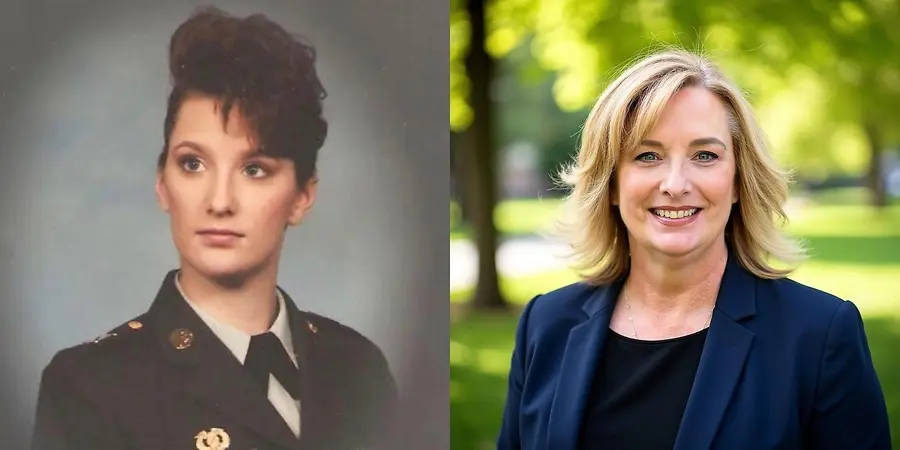The Influential Woman Leader: How Military Leadership Shaped Me for Every Professional Challenge

Growing up in group and foster homes meant learning life lessons through observation and self-reliance. Although the last four years before entering the military, I lived in my mother's house, I was still left on my own. From the time I turned 16, I had to pay for all my self-care—shampoo, soap, makeup, contacts, clothing, yearbooks, anything other than living under my mother's roof. I worked full-time my entire high school career, sometimes juggling two part-time jobs to make ends meet. I bought my very first car in my own name a week after I turned 18.
Despite these challenges, I became the president of our choral department in my junior year during which we won the best choir in Akron, Ohio and started to recognize and nurture my natural-born leadership abilities. In my senior year I won the Ohio State Music Award. Even though my family never came to any of my performances, I strived for something bigger and better for my life.
The Military Leadership Foundation
Everything I learned about leadership, structure, and professional excellence came during my 11 years of military service—and that foundation became the launching pad for every civilian success that followed. Military service isn't just about following orders; it's about strategic thinking, decision making and an intensive leadership development program that most people never experience.
During my Army career, I was immersed in structured leadership training, crisis management, and team dynamics that would transform my crude teenage leadership instincts into refined professional skills. This transformation was validated through significant military recognition: I earned Soldier of the Year for Fort Lee, Virginia in 1991 and graduated as Distinguished Honor Graduate from my BNCOC class, proving that military leadership development was successfully enhancing my natural abilities.
When my military career ended suddenly due to my son's serious health difficulties, I thought my leadership journey would cease.
Leadership Without a Paycheck
During my decade as a stay-at-home wife and mother, I completed my master's degree with a 4.0 GPA. More importantly, I used the leadership principles I learned in the military to raise three sons who are all very different yet successful men. This experience later inspired me to write "Back to School Success: The Academic Parent's Guidebook," which applies military structure and leadership to academic parenting while embracing each child's individuality.
Ironically, I never stopped leading within my community either. I became the cul-de-sac social secretary setting up yearly cul-de-sac parties, beginning & end of school year celebrations, Christmas parties, fall festivals and even ice cream socials. As the HOA security manager of a new development, I established the yearly National Night Out and Neighborhood Watch programs. Within my home church, I served as a liaison for the Titus Women (elderly ladies needing assistance), MOPS (Mothers of Preschoolers), and VBS group leader. Even without a traditional job title, I was still solving problems, building teams, and creating positive changes with my leadership and influence.
Career Acceleration Begins
When I returned to the workforce, my military leadership foundation created unprecedented career acceleration:
My first foray into the civilian workforce was with the Washington DC Government Protective Services Police Department which became my proving ground. In just 14 months, I advanced from a general service employee to the highest civilian position in the police department. In a male-dominated law enforcement environment, I found myself doing site visits, decommissioning plans, documenting orders during riots and contentious public events—crisis leadership skills directly transferred from military training.
Moving on to the Charles County Government offered new challenges and pioneering opportunities. I advanced from Executive Office Manager to Assistant Chief of Staff while revolutionizing veteran services. As the first-ever Veterans Service Manager for Charles County, I founded the Commission for Veterans Affairs, created the Veterans Corner program, and secured over $30,000 in state grants for Maryland's first non-law enforcement drug take-back program. I served as Executive Director of this innovative program.
Next, my Federal Government career brought full-circle validation. As the newest employee with less than two years of service, I became a recognized leader without holding a management position. Being listed as a technical advisor on contract negotiations—unprecedented for someone at my level—demonstrated that military leadership translates directly to federal innovation. My coordination of the digital PII protection pilot program, designed to protect high-profile employees against online security threats, expanded from five executives to over 800 participants when higher headquarters recognized its success and took over the program.
The Leadership Adaptation Insight
Here's what most leadership books won't tell you: effective leadership isn't about having one style—it's about having the emotional intelligence to adapt your leadership approach while maintaining effectiveness. My military training taught me direct, mission-focused communication. But civilian leadership helped me cultivate my nuanced adaptation:
• DC Government: Male-dominated environment felt familiar—direct military communication worked perfectly
• Charles County Government: All-female staff required significant adjustment—I had to find the softer side of my words and written communications to become more effective
• Federal Government: Back in a male-dominated field, I now use the perfect balance between civilian and military leadership styles
Creating Systemic Change
While maintaining my federal career, I launched multiple businesses and released two books, including my third upcoming "Operation FUBAR" book that is only the first in a series of eight books designed to assist veterans navigating the civilian world as veterans. But my most revolutionary innovation is the IGY6.2 Movement—a pay-it-forward model where veterans who succeed contribute to help other veterans get the strategic consultation they need. The intentional "2" in "Boots 2 Benefits" represents always having a partner, that connection and sustainable community support, not just one-time assistance and a boot out the door to navigate it solo.
This mission is not just about helping individual veterans; it's revolutionizing how veteran communities support each other in the civilian world through peer-driven advocacy that creates lasting change. I identified the gap between overwhelming mass of information and predatory high-cost claim services, then created an affordable, quality solution with built-in sustainability.
The Gap-Filler Mindset
As I've matured in my leadership, I've realized that I am not a leader who accepts the status quo. If there's a more efficient way to do something, I take steps to analyze and find a better solution. I'm driven to identify and fill gaps wherever I see them.
At Charles County, there were no veteran support services—so I created comprehensive programs from scratch. At Protective Services Police Department, critical processes were completely missing—so I wrote procedures to support the mission and enable leadership to make informed decisions about hiring, performance evaluations, and awards.
This gap-filling approach extends beyond fixing what's broken—it's about seeing what's missing and having the courage to build it. Whether it's veteran services, federal security programs, or sustainable community support models, I don't wait for someone else to solve the problem. I analyze, design, and create the solutions.
The Leadership Multiplier Effect
Military leadership training doesn't just prepare you for uniformed service—it becomes the blueprint for civilian career advancement, innovative program development, and measurable community impact. Whether you're leading neighborhood volunteers, government employees, or federal innovation teams, the principles remain constant while the delivery adapts to your audience.
True leadership is about being a force multiplier who creates positive impact everywhere you go. Military training gave me that foundation, but the real test came in applying those principles across multiple sectors—professional, community, and family—while maintaining authenticity and effectiveness.
The Bottom Line
Your background doesn't define your limitations—it defines your launching pad. Military leadership training, combined with the adaptability to meet people where they are, creates unlimited potential for professional growth and community impact. The question isn't whether you have leadership skills; it's whether you're ready to adapt them to create the change you want to see in the world.
Every professional challenge becomes an opportunity to demonstrate that influential women leaders don't just succeed—we transform the environments we enter and create lasting change that benefits everyone who follows.


